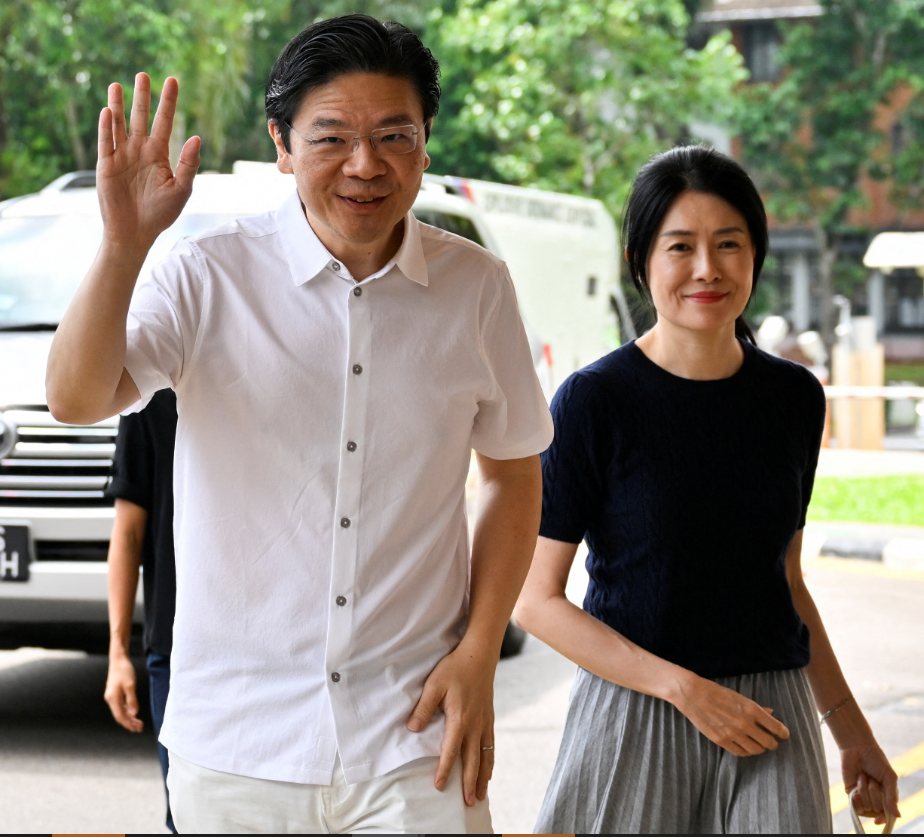5 minutes ago
- Copy link
Prime Minister Lawrence Wong and his People’s Action Party (PAP) won the general election in Singapore on Saturday. The party got 87 seats out of 97 parliamentary seats.
About 2.6 million people of Singapore, or 26 lakh people voted on Saturday. The main contest in the election was between the People’s Action Party (PAP) and the major opposition party workers party (WP) since 1965. Apart from these two, many other small parties were also in the fray.
Voting was held for 97 parliamentary seats in 33 constituencies of Singapore. These include single member Constituency (SMC) and Group Representation Constituency (GRC). In GRC, a team of 4-5 candidates contest the election, in which it is necessary to have a candidate of at least one minority community (Malay, Indian, or others).

Going to the polling booth to vote with Singapore’s PM Lawrence Wong wife.

Only Pap contested all seats 11 parties participated in the election, but only PAP contested all 97 seats. The Workers Party contested for only 26 seats. Only six parties contested more than 10 seats.
In the 2020 general election, voting was held for a total of 93 seats, in which PAP won 83 seats, got 61.24% votes. While the Workers Party won 10 seats.
Economic development, employment, rising inflation, health, education and minority community participation in this time election was a major issue.
PM Wong and Pap Global Economy sought a new mandate from the public amid uncertainties caused by the American tariff.

Singapore Deputy Prime Minister Heng Sweet is the senior leader of Pap.
Voting in Singapore is a civil duty Voting is mandatory for all citizens above 21 years of age in Singapore. A total of 95.81% polling was held in the 2020 election. This time too, it is expected that voting percentage will be quite high, as voting in Singapore is considered civil duty. Singapore uses the First-Past-The-Post System, with the highest number of votes winning candidates.
Trying to woo Indian community PM Wong has taken several steps to woo the Indian community. He said some time ago that the story of the Indian community is part of the story of Singapore. On the other hand, the focus of the opposition party WP is on enticing young voters and urban middle class.
Prime Minister Lawrence Wong announced last month that his PAP party would field candidates of Indian origin in this election. This step has been taken to recognize the contribution of the Indian community and increase their participation.
PAP did not field any new candidate of Indian origin in the 2020 election, after which many questions were raised about it. Among the population of Singapore, people of Indian origin are 7.5%, while 75% of Chinese origin and 15% of Malay origin are people.
Government of the same party for 65 years in Singapore
The People’s Action Party (PAP) in Singapore has been ruling continuously since 1959. Singapore’s political system is considered a “party system” like Japan (1955–1993, Liberal Democratic Party), where a major party ruins, and the opposition has limited impact.
PAP is the second longest-long-term party after the Institutional Revolutionary Party of Mexico (PRI, 1929–2000).
No other party government has been formed in Singapore for the last 65 years. However, there are many more parties in Singapore.

After winning the election in 1959, Lee Kuan You.
Why is the rule of the same party in Singapore
Lee Kuan You abolished the main opposition party in 1961 after becoming Prime Minister. After this, most opposition parties boycotted the election in the 1968 general election. In 1981, Workers Party (WP) won the first opposition seat (Enson).
For the first time, the Workers Party won the highest number of 10 seats in 2020. Pritam Singh got the status of a formal opposition leader. In the 2020 election, PAP secured 83 out of 93 seats and 61.2% votes. This time too, PAP party is likely to get power in Singapore.
Lee Kuan Yu’s Pap made Singapore the least corrupt and economically rich country in Asia. Because of this, most of the people of the country are satisfied with this party. Apart from this, PAP is also known for having a strict attitude against opposition leaders and journalists. This is the reason that the media is also engaged in support of government policies due to which the opposition party falls behind.
Along with this, contesting elections in Singapore is also very expensive. The candidate has to deposit a bail amount of more than 11 lakh Indian rupees. Due to this, it becomes difficult to raise resources and candidates with small parties.
